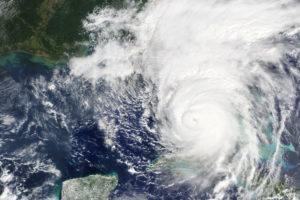9 Preparedness Tips for Dementia Patients During and After a Hurricane
 Storm season is in full force in South Florida. We have already experienced the devastation of Hurricane Irma, and we are reminded of the hard lessons we may have forgotten when handling our most vulnerable in society, the elderly. There can be deadly consequences if we are not overly prepared to keep our seniors safe after a storm when emergency services and electricity may be running at lower capacities.
Storm season is in full force in South Florida. We have already experienced the devastation of Hurricane Irma, and we are reminded of the hard lessons we may have forgotten when handling our most vulnerable in society, the elderly. There can be deadly consequences if we are not overly prepared to keep our seniors safe after a storm when emergency services and electricity may be running at lower capacities.
If you are a caregiver, it’s important that you are extra prepared prior to any major disaster, especially if you are caring for someone with dementia. A loved one with dementia can have a hard time understanding the impact of a natural disaster, and an even harder time if forced to evacuate. According to the Alzheimer’s Association, changes in routine, traveling, or a new environment may increase the risk of wandering or agitation in your loved one who is suffering from dementia. For these reasons and others, pay close attention to your loved one during these types of events, and consider these additional tips.
Tips to Help Dementia Patients During and After a Hurricane
- Prepare an emergency kit. Make sure your emergency kit has all the essentials such as medications, sanitary needs, extra clothing, important documents, and enough food and water for a few days. Also, make sure to pack comfort items for your loved one. In stressful times, it may be nice for them to have reminders of the comforts of home.
- Do not wait to plan or evacuate. Make all emergency plans before a disaster strikes. If you live in an area that is an evacuation zone, go immediately when ordered. Traffic and airlines can be a mess as the storm gets closer, but if you are able to leave in a timely fashion, you can ease the stress on your loved one.
- Find a Special Needs Shelter if possible. If you must take your loved one to a shelter, seek one that caters to special needs. Notify the staff of your loved one’s condition. Make sure they are also cognizant of wandering and watching to ensure patients are not leaving the shelter unaccompanied.
- Notify friends and family of whereabouts. This is especially important if you must evacuate. Ensure that friends and family know exactly where you are taking your loved one, and how to reach you if needed. Make sure that they also have copies of any important information that may need to be shared if there is an issue with your dementia patient.
- If patient is in residential facility, find out all the emergency plans for that location. Make sure you know the exact evacuation plans for the facility, where the nearest hospital is, and who you can contact to stay in touch with throughout the event. Take part in the preparation, and make sure the facility has extra clothing, supplies, and medication for the patients. Also, make sure they have a generator and ask how long they are prepared to be without power.
- Keep your loved one calm. Use a calm, soothing tone when speaking to him or her, and try to keep the conversation as positive as possible. Make sure you are being concise with directions and using his/her name when you speak to them. Hold hands and use a calm and comforting touch when needed. If your loved one is suffering from major anxiety, medications may be needed in order to keep the situation under control.
- Identify special needs equipment and have backups. If your loved one needs a walker or oxygen, make sure you have all medical equipment and backups for that equipment. There’s no guarantee that medical supply stores will be open in a decent amount of time following a natural disaster.
- Make sure all medical records are accessible and safe in a water-resistant container. You may need to quickly locate certain medical records during a disaster, so it’s important that you have them with you, and that they are safe from any potential water damage.
- Be patient. Natural disasters are stressful for anyone. It’s easy to feel overwhelmed if you are the caregiver of someone with dementia. For the benefit of your loved one and yourself, it’s best to exercise patience. It’s possible that nothing will go as planned, but with your preparation, supplies, and patience, a backup plan will be much easier to execute.
If you have a loved one who needs assistance, contact us to learn more about our in-home companion and nursing services. Our top-notch professionals are ready to assist you and your loved one in the comfort of their own home.
References:
In a Disaster | Caregiver Center. (n.d.). Retrieved September 18, 2017, from https://www.alz.org/care/alzheimers-dementia-disaster-preparedness.asp
Disaster Preparation for Caregivers. (n.d.). Retrieved September 18, 2017, from https://thealzheimerspouse.com/disaster-preparation-for-caregivers/



